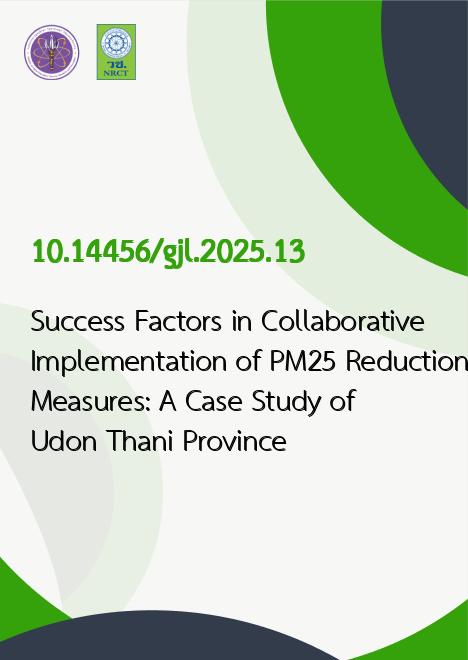
|
Success Factors in Collaborative Implementation of PM2.5 Reduction Measures: A Case Study of Udon Thani Province |
|---|---|
| รหัสดีโอไอ | |
| Creator | Jirawat Krantothong |
| Title | Success Factors in Collaborative Implementation of PM2.5 Reduction Measures: A Case Study of Udon Thani Province |
| Contributor | Panpun Ronghanam |
| Publisher | Department of Public Administration, Faculty of Liberal Arts, Kalasin University |
| Publication Year | 2568 |
| Journal Title | Governance Journal, Kalasin University |
| Journal Vol. | 14 |
| Journal No. | 1 |
| Page no. | 269-292 |
| Keyword | PM2.5, Collaborative Governance, Dust Reduction Measures, Udon Thani Province |
| URL Website | https://so01.tci-thaijo.org/index.php/gjournal-ksu |
| Website title | Governance Journal, Kalasin University |
| ISSN | ISSN: 3027-8589 (Online) |
| Abstract | This research aims to examine the patterns and processes of collaborative governance in implementing PM 2.5 reduction measures in Udon Thani Province, Thailand, and to analyze factors contributing to the success of collaborative governance in addressing PM 2.5 issues. The study employed interviews with the Provincial Working Group on Forest Fire, Smog, and PM 2.5 Situation Monitoring. The sample group consisted of 10 government agency heads or their representatives who held positions in the working group during 2023-2024. The findings revealed three patterns of integrated operations among various agencies in Udon Thani Province: 1) Co-ordination, involving basic information sharing to support joint operations; 2) Co-operation, characterized by information exchange and inter-agency support; and 3) Collaboration, featuring intensive joint operations, field work, and resource and personnel support. The study identified collaboration as the most crucial pattern for effective operations. Key success factors included information and expertise exchange between agencies, clear and consistent action plans, participatory management, and network building. Based on the research findings, the following policy recommendations are proposed: 1) Promote the development of a central database system accessible to all agencies with real-time updates to enhance information exchange and decision-making efficiency; 2) Organize regular training and knowledge exchange sessions between agencies to strengthen understanding of each agency's role and improve coordination efficiency; 3) Promote public participation through developing community volunteer networks to help monitor and report PM 2.5 situations in local areas; and 4) Implement systematic and continuous evaluation of various measures to develop more effective problem-solving approaches. The implementation of these recommendations will strengthen collaborative governance in addressing PM 2.5 issues sustainably. |
